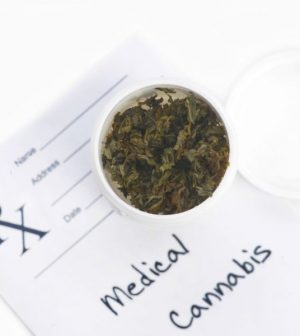- 8 Ways to Increase Dopamine Naturally
- 7 Best Breads for Maintaining Stable Blood Sugar
- Gelatin vs. Collagen: Which is Best for Skin, Nails, and Joints?
- The Long-Term Effects of Daily Turmeric Supplements on Liver Health
- Could Your Grocery Store Meat Be Causing Recurring UTIs?
- Are You Making This Expensive Thermostat Error This Winter?
- Recognizing the Signs of Hypothyroidism
- 10 Strategies to Overcome Insomnia
- Could Artificial Sweeteners Be Aging the Brain Faster?
- Techniques for Soothing Your Nervous System
Medical Marijuana Rx Ups Odds for Overuse, With No Benefit to Health: Study

Using medical marijuana to treat pain, anxiety or depression may quickly lead to dependence, without relieving symptoms, a new study suggests.
Those most at risk for misusing medical marijuana are patients using it to treat anxiety and depression, the researchers found. Based on these findings, the benefits of medical marijuana may have been exaggerated, the study authors said.
“We found that people who obtained medical marijuana cards were at increased risk for developing cannabis use disorder within the first 12 weeks of owning a card,” said lead researcher Jodi Gilman, of Harvard Medical School and the Center for Addiction Medicine at Massachusetts General Hospital, in Boston.
To get a medical marijuana card, patients need a doctor’s written OK, but it need not come from their primary care physician and no follow-up is required. Thirty-six states and the District of Columbia have commercialized marijuana use for a variety of health conditions.
“Adults seeking to use cannabis for medical complaints through commercialized cannabis did not report relief from pain, depression or anxiety,” Gilman said, of the study findings. “They did, however, report improved sleep.”
She said it’s important to weigh the risks of using marijuana for medical conditions without guidance on products, dosing or potency.
“For most people, there are likely better treatments for their medical conditions — treatments that have been tested thoroughly for safety and efficacy,” Gilman said. “Cannabis has been approved by legislatures or on a ballot, without testing that is required for other medicines.”
In this study, Gilman’s team assigned 269 adults in the greater Boston area who were seeking a medical marijuana card to either get it immediately or wait for 12 weeks.
The researchers found that the odds of developing cannabis use disorder were nearly two times higher among those who got their card right away compared to those who had to wait.
After 12 weeks, 10% of the group with cards had developed a dependence on marijuana, the study authors said. That percentage doubled to 20% for those using marijuana to treat anxiety or depression, the researchers reported.
“We have created a system where patients can use cannabis as a medicine without any medical oversight by doctors,” Gilman said. “People need to be cautious about using cannabis for medical conditions and realize that cannabis is a psychoactive substance that is not without some risk.”
But two experts who reviewed the study said it had shortcomings.
Mitch Earleywine, a professor of psychology at the University at Albany in upstate New York, said the study raised more questions than answers about marijuana dependence.
The transition to a diagnosis of cannabis dependency can come from a single new symptom, he pointed out.
“I can certainly imagine that ‘craving,’ which we’ve found in people who’ve never used cannabis in my lab, might increase in someone who finally gets a card, though I’m unclear how it can be particularly distressing or impairing,” Earleywine said. “I can certainly imagine someone being willing to swap anxiety for cannabis craving.”
Tolerance is bound to increase with regular use, he said. But the idea that it’s a problem got borrowed from literature about alcohol and hard drugs, because those drugs are so toxic, while cannabis is not, Earleywine added.
“Cannabis use disorder is hard to take seriously if we don’t know which symptoms are increasing, and I wouldn’t blame someone for trading one of the cannabis use disorder symptoms for insomnia or anxiety,” he said.
Paul Armentano, deputy director of NORML (the National Organization for the Reform of Marijuana Laws), noted that the study didn’t define symptoms of marijuana abuse or how they affected study participants.
He also said these findings run counter to results of other studies.
“It should be recognized that virtually all therapeutic agents possess varying safety profiles,” Armentano said. “Medical cannabis is not innocuous. But its safety profile is far superior to that of many conventional pharmaceuticals for which it can provide an alternative — including opioids and benzodiazepines — even if one is to take these findings at face value.”
The study was published online March 18 in JAMA Network Open.
More information
For more about marijuana, visit the U.S. National Institute on Drug Abuse.
SOURCES: Jodi Gilman, PhD, associate professor, Harvard Medical School, and director of neuroscience and principal investigator, Center for Addiction Medicine, Massachusetts General Hospital, Boston; Mitch Earleywine, PhD, professor, psychology, University at Albany, Albany, N.Y.; Paul Armentano, deputy director, NORML, Washington, D.C.; JAMA Network Open, March 18, 2022, online
Source: HealthDay
Copyright © 2026 HealthDay. All rights reserved.










